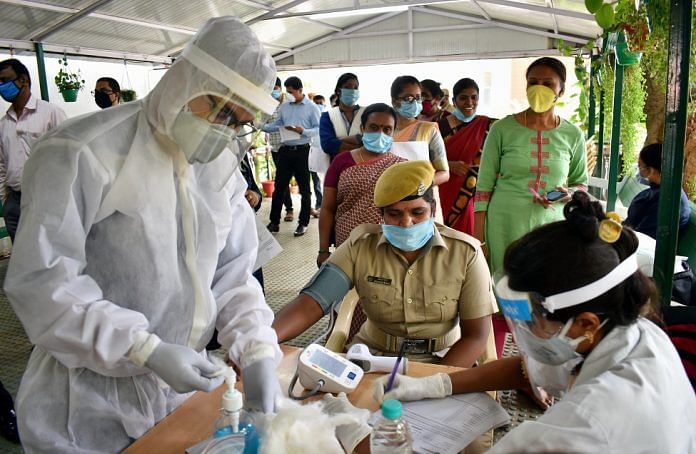New Delhi: The Indian Council of Medical Research (ICMR) has issued new guidelines, prioritising the IgG test, which detects Covid-19 antibodies, for ‘high risk’ professionals such as the police, drivers, shopkeepers, migrants, healthcare workers as well as vulnerable groups with compromised immunity.
Antibody tests detect the presence of antibodies that fight the Covid-19 infection in the body thus revealing exposure to the virus. They have been approved along with antigen tests to detect the presence of the protein on Covid-19 virus, for field level detection of Covid-19 cases.
The guidelines regarding the strategy to implement rapid antigen testing and IgG antibody tests issued Tuesday are part of the apex research body’s to scale up and improve access to testing.
The new testing strategies are in addition to the gold standard RT PCR and cartridge-based CBNAAT and TrueNat methods used for diagnosing Covid-19.
The ICMR has also now allowed accredited private hospitals and laboratories to conduct rapid antigen tests that give results in less than half an hour and which can be carried out at the field level.
Also read: Delhi’s testing numbers increase by almost 3 times — just as Amit Shah had promised
Symptomatic negative patients to undergo another test
The latest guidelines are all part of efforts to improve testing in the country.
It comes some 10 days after the ICMR had on 14 June approved the use of rapid antigen tests as a testing tool in containment zones and hospitals, under medical supervision.
Under the new guidelines, the apex body has also allowed private hospitals and private laboratories to function as Covid-19 testing labs if they already had approval from the National Accreditation Board for Hospitals & Healthcare (NABH) and National Accreditation Board for Laboratories (NABL), bodies that set quality standards and certify institutes, respectively.
The new norms, however, state that institutes conducting the rapid antigen tests would need to register and add patient details on the ICMR’s portal in real time and tie up with RT PCR testing centres for further referral.
Since antigen tests have low sensitivity, which is the ability to detect true positives, negative samples of suspect cases had to be retested by RT PCR under the old guidelines.
The new guidelines clarify that only “symptomatic negative patients should be essentially referred to a real-time RT-PCR test for Covid-19”. They have also stressed that test, track and treat is the only method to prevent the spread of disease and “testing should be made widely available to all symptomatic individuals in every part of the country.”
Tests to realise extent of exposure
Under the new guidelines, ICMR has approved ELlSA and CLIA tests that detect the IgG but they are to be used only for studying exposure through sero-surveys and not for diagnosis.
Sero-surveys help in understanding how many people, including those asymptomatic, have been exposed to the infection. This helps the government in implementing its strategies of prevention and control.
IgG antibodies appear in the body two weeks after the onset of infection and after the individual has recovered from the infection. They may offer immunity but a new study showed that the immunity may not last for more than two or three months.
India has already conducted a sero-survey in the general population and found that less than 1 per cent of those surveyed in 65 districts had been exposed to the virus. Another survey has been conducted on those who are living in hotspots and containment zones whose results are still not released.
The new guidelines extend these tests to high risk and vulnerable groups such as farmers, the media, staff in municipal corporations, employees of banks, courier companies, air travel-related staff apart from those mentioned earlier.
The norms also cover those in old-age homes, shelters and orphanages.
The guidelines further advise government and private hospitals, offices, public sector units to perform antibody-based testing that will “help in allaying the fear and anxiety of health care workers, office employees etc”.
Also read: Public lockdown discipline fast eroding, India risks becoming lax in Covid fight




The results of all these tests should be updated in the Arogya setu app.